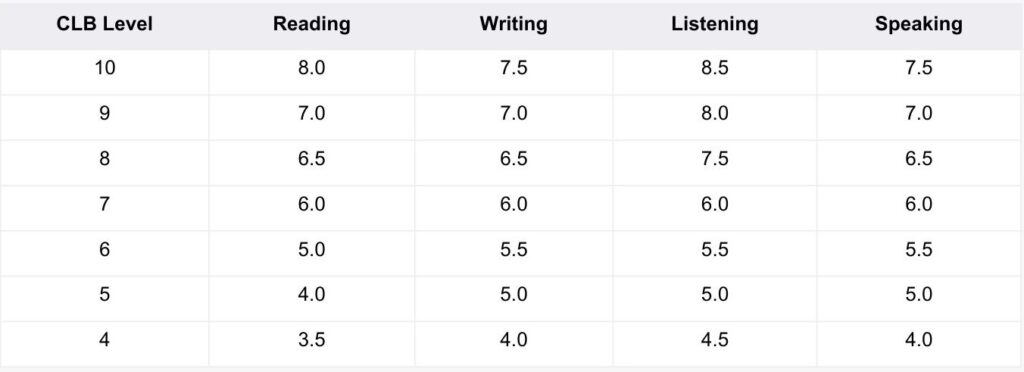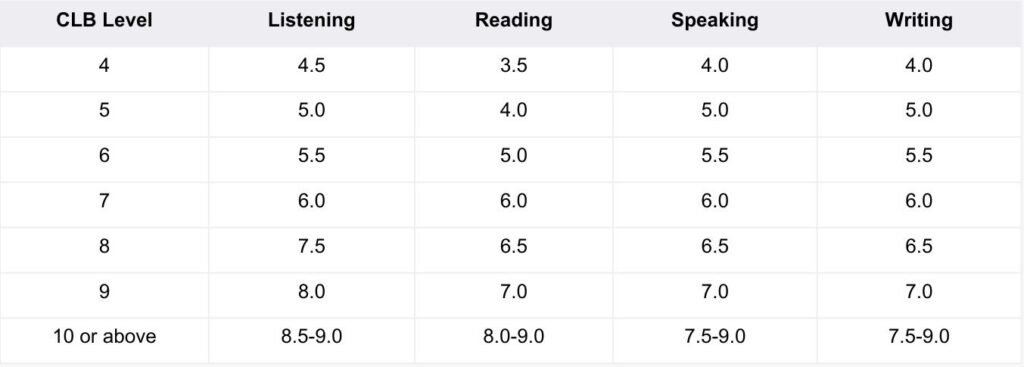Do you know that every year, over 4 million students choose to sit for the IELTS exam?
Table of Contents
IELTS is one of the widely recognised English language proficiency tests accepted by over 12,000 organisations globally in over 140 countries.
If you intend to work in Canada, you’ll need to apply for a Canada work permit, also known as a work visa. This visa, issued by the Government of Canada, allows you to work in the country for a specific period. One key requirement for obtaining this permit is proving your language skills, usually through an IELTS score.
Immigration, Refugees and Citizenship Canada (IRCC) accept IELTS as proof of your English proficiency. For many jobs that require strong english language skills, having a good IELTS score can be quite beneficial. It ensures you can communicate effectively and integrate into Canadian society smoothly.
Over the past 5 years, over 25 lakhs individuals have taken the IELTS to pursue their study aspirations in Canada. By getting familiarise with IELTS can help with your plans.
In this blog, we will discuss the importance of the IELTS required for a Canada work permit, along with eligibility, process and required documents.

Latest Updates: Changes in Canada Work Permit Regulations
In recent months, there have been significant changes made to Canada’s work permit regulations for international students.
Here are the changes made:
- Potential Restrictions on Post-Graduation Work Permit (PGWP)
- The Canadian government is consulting with provinces to align the PGWP program with labour market needs and reduce the overall volume of PGWP holders.
- The goal is to facilitate work permits for students entering occupations with labour shortages while reducing access for graduates from other programs.
Proposed changes include:
- Requiring a job offer aligned with the shortage list to extend PGWP beyond 1 year.
- Considering additional criteria like language skills or provincial support for PGWP extension.
- Potentially enforcing labour market-based PGWP eligibility changes for all graduates starting this year, not just new students.
- Increased Off-Campus Work Hours
- Effective September 2024, the temporary policy allowing international students to work more than 20 hours per week off-campus will end.
- The new limit will be 24 hours per week off-campus.
- This change is due to concerns over international students’ academic performance and the risk of dropping out when working excessive hours.
- Stricter Regulations for Designated Learning Institutions (DLIs)
- The proposed amendments aim to give Immigration, Refugees and Citizenship Canada (IRCC) more control over DLIs and international students in Canada.
- These changes would require post-secondary DLIs to comply with specific conditions, such as reporting student attendance and enrollment status.
- The recent push for stricter regulations on DLIs indicates a growing concern about the quality of education, student welfare, and the overall integrity of the international student program.
- Cap on International Student Intake
- Canada has introduced a 2-year cap on new international student permits starting in 2024.
- This measure is designed to manage the rapid increase in international students and address concerns about housing and public services.
- Changes to Spouse Open Work Permits
- Earlier spouses of international students enrolled in any degree program were eligible for an open work permit.
- However, as of March 19, 2024, this eligibility has been narrowed down. Now, only spouses of students enrolled in master’s or doctoral programs at a university or polytechnic institution are eligible for an SOWP.
Impact on Indian Students
- According to the Canadian government briefing paper, these changes could significantly impact Indian students, as they make up 40% of study permit holders in Canada.
- Many Indian students choose courses that may not align closely with their long-term career goals to secure a study visa and PGWP. The proposed changes aim to restrict this practice.
- Experts advise Indian students to choose skill-based, specialised programs aligned with Canada’s labour market demands to improve their chances of obtaining a PGWP.
Let’s discuss the importance of IELTS for a Canada Work Permit.
Importance of IELTS Required for Canada Work Permit
The IELTS exam assesses your ability to effectively communicate in English. If you’re aiming to work in Canada, it is important to have a strong command of the English language.
Proficient language skills can improve your ability to communicate effectively in both daily and professional settings. These skills are crucial for getting jobs, pursuing higher education, and building a strong network with people.
Moreover, a solid grasp of the English language can make it easier to adapt and settle in Canada. That’s why Canadian immigration officials consider the IELTS score as a fair and objective measure to evaluate your language skills.
IELTS is accepted by 12,500 organisations worldwide and is primarily of two types:
- IELTS Academic: This test is for those who aspire to pursue higher education in English-speaking countries.
- IELTS General Training: This test is for those who wish to migrate for employment purposes or enrol in below degree level.
For Canadian immigration, the IELTS General Training is required. To qualify, you need to achieve a minimum band score.
Read more about the IELTS pattern.

Excel in IELTS with India’s Top Online Coaching
Leap has helped more than 1 Lakh students achieve 7+ IELTS band.
Types of Canadian Work Permit
Did you know that every year, millions of people either move permanently or temporarily to Canada for work purposes? This means there is a huge opportunity for individuals seeking to contribute to Canada’s workforce in a meaningful way. You can avail many benefits under a Canada work permit:
- Work in Canada with the employer specified in your work permit application.
- Relocate to Canada with your family
- Get access to free healthcare benefits
- Take the fastest route to settle in Canada
- Travel and explore Canada
- Avail retirement benefits
- Apply for a PR visa if you meet the eligibility criteria.
The Canadian government offers different work permits based on your situation, the type of work you’ll be doing, and specific requirements. It’s important to figure out which permit best suits your needs before you move to Canada.
Canada offers two types of work permits: Open Work Permit and Employer Specific Work Permit.
1. Open Work Permit:
The open Work Permit allows you to work with any eligible employer in Canada.
However, you can only apply for an open work permit if:
- You are a graduate from a designated academic institution and are eligible for a post-graduation work permit.
- You are a student who is unable to meet the cost of studies.
- You have applied for PR in Canada.
- You have applied for an employer-specific work permit and got abused or are at risk of getting abused at the job in Canada.
- You are a spouse or a common-law partner of a student or a skilled worker.
- You have a dependent who applied for a PR in Canada.
- You have a spouse or common-law partner who applied for the Atlantic Immigration Pilot Program.
- You are a refugee, refugee claimant, protected person, or you’re their family member.
- You are a temporary resident permit holder.
- You are a younger worker participating in special programs.
- You are under an unenforceable removal order.
- You are being sponsored as a spouse, common-law partner, conjugal partner or accompanying dependent child.
- You are a Quebec investor who received a Quebec Notice of Intent to select.
Although all conditions are listed above, candidates are advised to check these pointers before application.
2. Employer-specific Work Permit:
The employer-specific work permit allows you to work in Canada as per the conditions specified in the work permit. It includes:
- Duration of work
- Name of the employer a candidate can work for
- Location (if applicable)
Before you apply for an employer-specific work permit, your employer must provide you with the following things:
- A copy of your employment contract
- Any one of the following:
- a copy of a labour market impact assessment (LMIA)
- an offer of employment number (for LMIA-exempt workers)
Dependent Work Visa for Canada
This dependent work visa allows dependents to work or study in Canada. According to Canada Dependent Visa, you can sponsor –
- Conjugal partner or spouse or common-law partner
- Dependents’ grandparents or parents
- Children under 22 years of age
- An adopted child outside Canada when the applicant has Canadian citizenship or PR
- Close relatives of the applicant, such as a niece, sister, brother, aunt, uncle, nephew or other close relatives

Excel in IELTS with India’s Top Online Coaching
Leap has helped more than 1 Lakh students achieve 7+ IELTS band.
The Pathways to Work and Obtain PR in Canada
Did you know that according to the immigration level plan for 2024-2025, Canada aims to welcome 1.5 Million PRs by 2026? This highlights its commitment to diversity and its desire to attract skilled individuals from around the world.
IELTS was the first test to be recognised by Citizenship and Immigration Canada (CIC) and Immigration Quebec to prove English language skills for various immigration programs.
If you’re planning to apply for a PR or work visa, you have several options. The most common route is Express Entry. It’s an online system that helps manage applications from skilled workers who want to move to Canada permanently. This system handles three main economic immigration programs:
- Federal Skilled Worker Program: It is a prime gateway for individuals with foreign work experience and no connections with Canada to apply for PR.
- Federal Skilled Trades Program: It is a fast option for skilled workers who are qualified in a skilled trade to obtain PR in Canada.
- Canadian Experience Class: It is the fastest route for obtaining permanent residence in Canada for skilled workers with eligible Canadian work experience
All these programs are designed to suit your skills and experience.
To ensure a smooth application process, the IRCC typically takes around 6 months to process applications. So, it’s crucial to make sure that your IELTS test results remain valid for the entire duration of the process.
To get permanent residency through Express Entry, you need a minimum IELTS score of 6.0 in each section. Along with that, you need to submit various documents for the application.
Whether you’re applying for a work visa or permanent residency, having a good IELTS score can really improve your chances of getting a visa.
Let’s discuss the minimum score requirements for a Canada work permit.
Explore all countries
Minimum IELTS Required for Canada Work Permit
The minimum IELTS score required for a Canada work permit is 6.0 overall. However, it can vary depending on the specific immigration program and job you’re applying for.
Canada uses the Canadian Language Benchmarks (CLB) to assess English proficiency for immigration purposes.
The CLB system categorises English skills in four areas: listening, reading, writing, and speaking. Your overall score is calculated by averaging the four scores. Then, your IELTS score is converted to a CLB score to access your application.
The table below illustrates the relationship between IELTS individual component scores and the corresponding CLB levels:

Also, each work permit program has a specific CLB requirement.
1. Federal Skilled Worker Program (FSWP):
This program is designed for skilled workers with foreign work experience who want to immigrate to Canada permanently.
To be eligible for the FSWP, you generally need a minimum score of CLB 7 in English. This means that the minimum IELTS score required in all 4 sections( reading, writing, listening, and speaking) is typically a band 6.
The following table shows the minimum IELTS per band score for different CLB levels:
First Official Language

Second Official Language (OPTIONAL)

2. Federal Skilled Trade Program (FSTP):
This program is designed to provide a route for skilled tradespeople to immigrate to Canada. It is a fast option to get the right to live and work in Canada permanently.
To be eligible for the FSTP, you generally need a minimum score of CLB 4 in English.
The following table shows the minimum IELTS per band score for different CLB levels:

3. Canadian Experience Class:
The program is designed for those who have already gained skilled work experience in Canada and want to become permanent residents. It is also one of the fastest routes, which takes three to four months to process.
Your work experience in Canada in an occupation classified under National Occupational Classification (NOC) based on your training, education, experience and responsibilities (TEER):
- TEER 0: Management occupations(e.g. Advertising, marketing and public relations managers)
- TEER 1: Occupations that generally require a university degree(e.g. financial advisors,
- software engineers)
- TEER 2: Occupations that usually require a college diploma, apprenticeship training(2 or more years) or supervisory occupations(e.g. Computer network and web technicians)
- TEER 3: Occupations that usually require a college diploma apprenticeship training(less than 2 years) or atleast 6 months of on-the-job training(e.g. bakers)
The NOC is a standardised system that assigns a code and job description to every single occupation that exists in the Canadian labour market.
For the CEC, the minimum IELTS score you need for a Canada work permit depends on the NOC level of the job you’re applying for:
- NOC A jobs (highly skilled): It requires a CLB 7 in language proficiency, which translates to a minimum score of 6.0 in each section of the IELTS exam.
- NOC B jobs (skilled): It requires a CLB 5 in language proficiency( Minimum score of 4.0 in Reading and 5.0 in the other three sections)
The following table shows the minimum IELTS per band score for different CLB levels:

Read more about: IELTS Score for Canada 2024: Minimum IELTS Band Requirement for Canada
Process To Apply For A Canadian Work Permit
To apply for a work permit visa, you need to identify the NOC code. It is a system that assigns a unique code to every single occupation in Canada.
Here is a step-wise process to apply for a Canada work permit:
- Find the right program: Research immigration programs offered by Canada, like Express Entry, Provincial Nominee Programs (PNPs), or specific initiatives like the Atlantic Immigration Pilot. Choose the program that aligns with your skills and experience.
- Secure a job offer: A valid job offer from a Canadian employer is crucial. Depending on the program, the employer may need to obtain a Labour Market Impact Assessment (LMIA) from Employment and Social Development Canada (ESDC) to demonstrate the need for a foreign worker.
- Gather required documents: You need to prepare essential documents like your identification, educational credentials, work experience proof, and the official job offer letter.
- Apply for a work permit: The application process is generally done online through the Immigration, Refugees and Citizenship Canada (IRCC) website. This usually involves creating an online profile detailing your skills, work experience, education, and other relevant information.
- Submit your application: Fill out the online application form, submit all required documents electronically, and pay the necessary fees.
- Biometrics and medical exam: To ensure that you are medically fit, You may need to provide biometrics (fingerprints and photo) and undergo a medical exam by an approved physician.
- Wait for processing: Be patient, as processing times can vary depending on the work permit type and chosen immigration program.
- Receive your work permit: Once approved, you’ll get your Canada work permit. Verify details like type of work, location restrictions, and validity period.
- Arrive in Canada: It is advisable to enter Canada before the date specified on your work permit and make sure to adhere to the conditions outlined in it.
- Consider permanent residency: While on a work permit, you can explore pathways to permanent residency in Canada, such as the Canadian Experience Class within Express Entry or specific Provincial Nominee Programs.
Also Read: Cost Of Studying In Canada For Indian Students 2024-25
Eligibility for Canadian Work Permit Visa
Before applying, you need to meet certain eligibility requirements first. Although the eligibilities depend on the type of work visa you are applying for, you need to meet these compulsory eligibilities first :
- You should have enough money to sustain yourself in Canada and return home.
- You must prove to an immigration officer that you will leave Canada when your work permit expires.
- You should not be a danger to Canada’s security(clean criminal record)
- You should meet the medical examination requirements.
- You shouldn’t have any plans to work for an employer listed as ‘ineligible’ in ’employers who failed to comply with the conditions.
- You should provide any additional documents concerning officer demands.
If you are looking to apply for a work visa from outside Canada, you generally need a valid job offer supported by a Labour Market Impact Assessment (LMIA). However, you should check visa-specific requirements depending on the location of the application.
Documents Required for Canada Work Permit Visa
Before you apply for a Canada Work Visa, you must arrange a few documents required for application.
The list of documents required are listed below –
- Completed application forms
- Proof of status in Canada (if applicable)
- Labour Market Impact Assessment (if applicable)
- Written offer of employment (if applicable)
- CV/ resume
- Marriage certificate (if applicable)
- Certificat d’acceptation du Québec (CAQ) (if applicable)
- Proof that you meet the job requirements
- A valid copy of your passport
- Medical exam results (if requested)
- Evidence of financial means to stay in Canada and return to home country
- Proof of work experience and professional qualifications
- Two recent photographs, along with accompanying family members
- Proof of available funds
- Educational qualification documents
- Police certificates from any country you have lived in for six months or more since turning 18 (if required)
- Proof of evidence of relationship with a common-law partner, children, and spouse.
- Completed application forms for IMM 5645, IMM 5488, IMM 5476, and IMM 5409.
Besides these documents, you might also check beforehand if IELTS is required for a Canada work permit. Additionally, you might also be required to submit additional documents, so it is advised to review this requirement from the official website.
Also Read: Statement of Purpose (SOP) for Canada 2024
Document Required for Dependent Work Visa for Canada
Here is the list of documents required to apply for a dependent work visa –
- Travel history and passport
- Partner/spouse document and marriage certificate (if applicable)
- Background documentation
- Proof of Relationship
- Income proof if the sponsor displays adequate financial resources
- Application and fee
- Medical examination results (if required)
You can also apply for Canadian citizenship to stay and work in Canada. However, to apply for citizenship, you must –
- be a permanent resident
- have resided for at least 3 years in Canada, out of 5 years (1,095 days).
- passed citizenship test
- have paid taxes (if applicable)
- proof of English language skills or French

Job Opportunities In Canada
According to Canada’s latest Labor Force Survey(May 2024), the country witnessed a net increase of 27,000 jobs. This highlights the growing job market for Indian students in Canada.
Toronto, one of Canada’s largest cities, is often referred to as the “Silicon Valley of the North” due to its thriving tech industry. In addition, other cities like Vancouver, Montreal, Ottawa, and Calgary also offer ample job opportunities across various sectors. This means there is a huge scope in terms of job prospects if you’re planning to work in Canada in your desired field.
Here are some benefits of working in Canada:
- Labour laws ensure a high degree of safety in the workplace.
- Laws and regulations are strictly followed to ensure the well-being of employees.
- Canadian wages are competitive for in-demand jobs.
- Some Canadian work permits enable the spouses and children of workers to accompany them to Canada.
- With Canadian work experience, an overseas skilled worker can enhance eligibility for various PR programs.
The average salary in Canada for full-time jobs is around CAD $64,850 (INR 39L) per year.
The most in-demand job roles in Canada are given below in the table:
| Job Role | Average Annual Salary(INR) |
|---|---|
| Web Developers | 44 L |
| Electrical Engineer | 55L |
| Cardiologist | 1 Cr |
| Psychiatrist | 1 Cr |
| Physician | 1.7 Cr |
| Pharmacist | 61L |
| Surgeon | 1.4 Cr |
| Orthodontist | 44L |
| Chief Marketing Officer | 71L |
| Software Engineering | 61L |
Note: The above figures may vary as per changes in the Canadian dollar rate.
Also Read: Cost Of Living In Canada For Indian Students [2024 Updated]

Conclusion
The IELTS exam is a widely accepted English test for Canada immigration to demonstrate your English language proficiency. If you are 18 to 44, you must meet the Canadian Language Benchmarks Level 4 or higher in either English or French. Therefore, having an English language test for Canadian immigration is crucial.
Additionally, you can also immigrate to Canada through the Express Entry system.
While the IELTS is not mandatory for a Canadian work permit, a good score can enhance your chances of approval. If your job offer requires English or French skills and you are from a non-English or non-French-speaking country, an immigration officer may request evidence of your language abilities, such as a language test.
If you need guidance for your IELTS preparation, feel free to reach out to our expert counsellors.
With Leap Scholar’s free IELTS masterclass, get expert evaluation and personalised feedback. Book a free session right now!
Frequently Asked Questions
Q. Is IELTS Required For Canada Work Permit?
Ans. Yes, IELTS is required for a Canada work permit. The minimum IELTS score required for a Canada work permit varies depending on the type of work permit and the applicant’s occupation. Generally, a minimum overall score of 6.0 in the General Training test is required, with a minimum score of 6.0 in each language ability (reading, writing, listening, and speaking). However, applicants should check these from the official website before applying.
Q. Can I get a Canada Work Visa from India?
Ans. Applicants from India have the opportunity to apply for a work visa in Canada. However, it is important for them to thoroughly review the specific requirements and conditions before initiating the application process. Additionally, seeking advice from a qualified immigration consultant or lawyer can improve the chances of a successful application.
Q. What is the band requirement for a Canada work permit?
Ans. The band requirement for a Canadian work permit varies depending on the type of work permit and the applicant’s occupation. Some work permits may require a higher score, such as the Federal Skilled Worker Program, which requires a minimum score of 7.0.
Q. If I have a Canadian job offer, am I eligible to apply for a work permit?
Ans. Having a Canadian job offer makes you eligible to apply for a work permit, but you must also meet other requirements, such as having the necessary qualifications, experience, and language proficiency. In other words, getting an opportunity to work in Canada can be exciting, but it also means having some requirements and responsibilities.
Q. What am I allowed to do on a Canadian work permit?
Ans. A work permit allows you to work for a specific employer in a specific job. You are only allowed to work for that employer and in that job. You may also be allowed to study, but you must apply for a study permit. However, It’s important to keep in mind that violating the conditions of your work permit could result in serious consequences, so it’s always best to stay informed and follow the rules and regulations.
Q. Can my family be included on my work permit application?
Ans. Yes, your family can be included in your work permit application. Your spouse and children may be eligible to work or study in Canada, but they must apply for their own work or study permits. However, before applying for work permits, you should check the specific requirements for your family members’ applications.
Q. How much does a Canadian work permit cost?
Ans. The cost of a Canadian work permit varies depending on the type of permit and the applicant’s country of residence, but it typically ranges from CAD $155(INR 9K) to CAD $1,050(INR 64K). Additionally, you may need to pay biometric fees (if required), so make sure to complete the payment process.
Q. Is a 7.5 IELTS score good for Canada immigration?
Ans. Yes, a 7.5 IELTS score is considered very good for Canada immigration. It exceeds the minimum requirements for most immigration programs and can significantly enhance your Comprehensive Ranking System (CRS) score in the Express Entry pool. Higher language proficiency scores can improve your chances of receiving an Invitation to Apply (ITA) for permanent residency.
Q. How difficult is it to get a Canadian work permit?
Ans. Obtaining a Canadian work permit can be challenging due to various eligibility criteria and documentation requirements. The process involves securing a job offer from a Canadian employer, who may need to obtain a Labour Market Impact Assessment (LMIA). Additionally, meeting language proficiency, educational, and work experience requirements is essential. Proper preparation and understanding of the process can help navigate these complexities.
Q. I have a Canadian work permit. What should I do if my permit needs to be corrected?
Ans. If you make a mistake in your work permit, you should contact the immigration officer who issued the permit or apply for a correction through the Immigration, Refugees and Citizenship Canada (IRCC) website. It’s important to make sure that all the information on your work permit is accurate and up to date.
Q. How long is the IELTS score valid for Canada work permit applications?
Ans. The IELTS score is valid for two years from the test date for Canada work permit applications. It is crucial to ensure that your test results are valid throughout the application process to avoid delays or the need for retesting. If your IELTS score expires during the application process, you will need to retake the test and submit a new score.
Q. Can I hold 2 valid work permits at the same time?
Ans. Yes, you can hold two valid work permits simultaneously as long as you adhere to the conditions specified on each permit. When you receive a new work permit, the previous one remains valid until it expires or until a removal order is enforced. It is important to ensure compliance with all conditions to avoid any legal issues.














Have Questions? Get Guidance to reach your Dream University
Connect with India's finest counsellors and biggest study abroad community.
Get Guidance